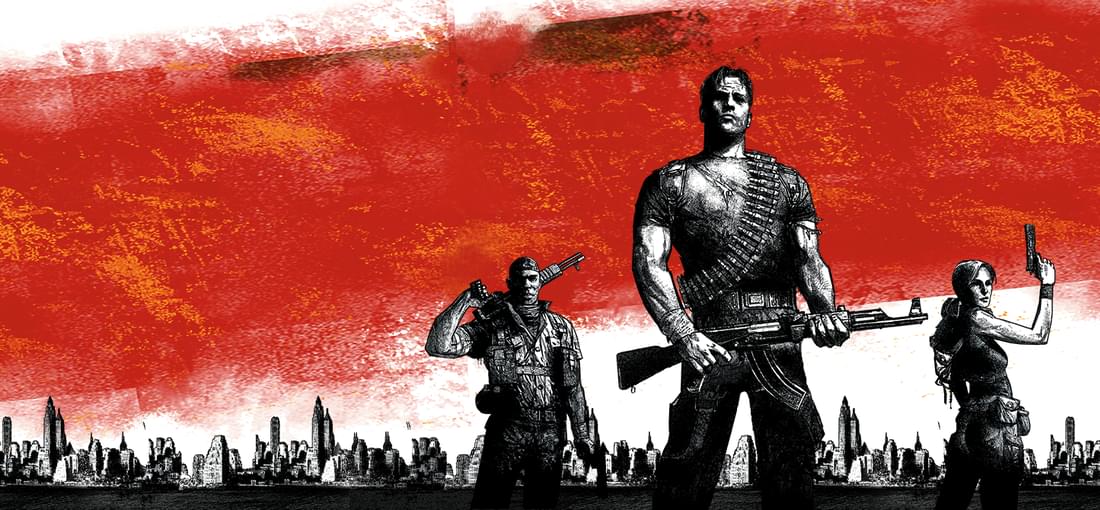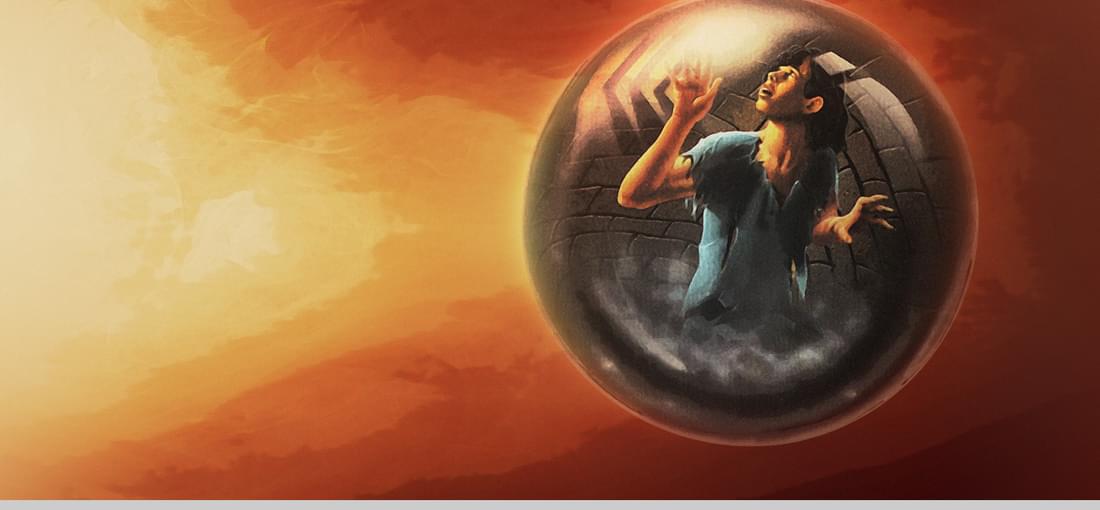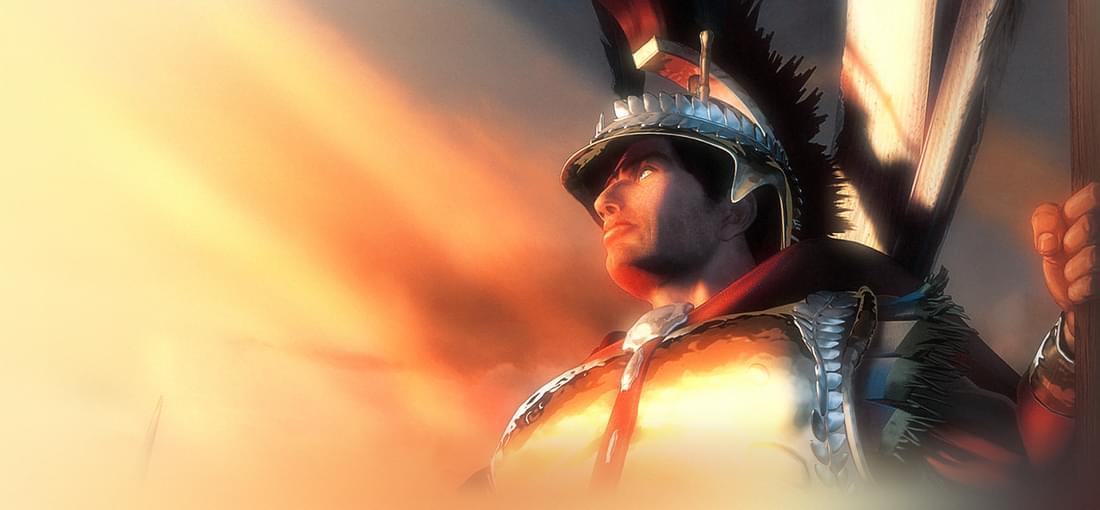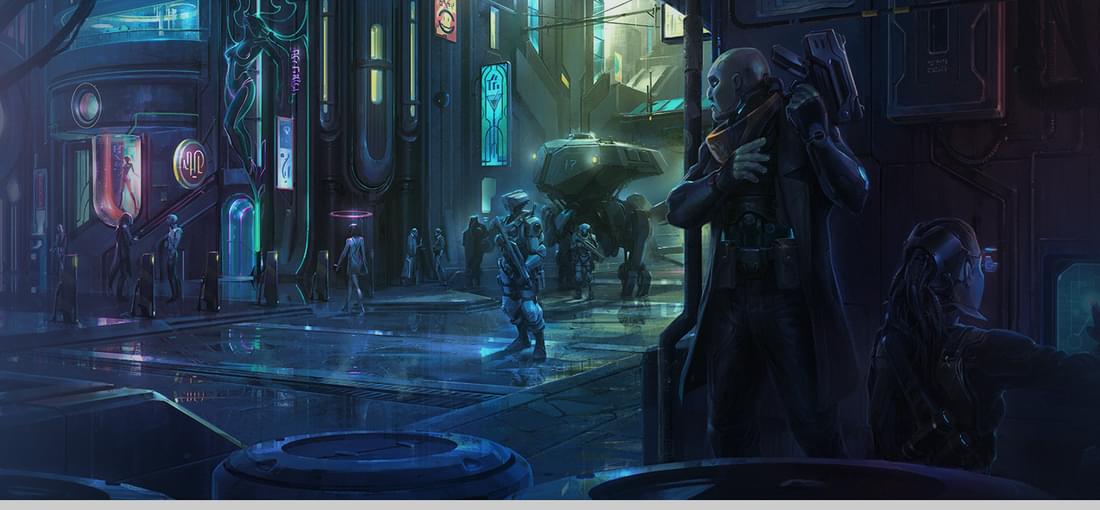


The most interesting thing to me about Freedom Fighters, a mid-2000's shooter on the XBox is that it's extremely demonstrative of the time it was made and the platform it was released on. There were a lot of shooters on the XBox released around this time that look and play like this- it's a genre that's not seen quite as commonly nowadays, squad mechanics having been almost entirely supplanted with co-op in modern games. Also, it's about in the middle in terms of enjoyment; it's competently made, but nothing special. The game is set during an alternate timeline with a Soviet invasion of the USA, with you playing the leader of a resistance movement in NYC operating from the sewers. The story is slightly above the minimum, enough to drive the game forward but otherwise largely forgettable. The game itself is... fine. It's squad mechanics are simple and intuitive, and the AI is responsive and reliable. It's key feature is multiple missions objectives that impact the environment- destroy a power line, and sneaking past the floodlights is easier, destroy the helipad so gunships don't harass you and so on. The minute-to-minute gameplay is very simple, and quickly gets repetitive- this is a game to play in bursts. There a few rough edges, particularly with the camera and aiming, and like every shooter in the mid-2000's, it has stealth sections and no one likes them. If you had an XBox in 2003, you've played this game. Not this one exactly, but Brute Force, Conflict Desert Storm, Armed & Dangerous, Rogue Trooper- Freedom Fighters slots right into the middle of that list. It's not especially interesting on it's own in 2020, but if you didn't have an XBox and wonder what that era of games was like, this is about as representative as it gets.

I sat down with a few friends to play through the Kings Quest series, and to my genuine surprise, these games are quite well. Although prototypical, very simple and comically dated in appearance, the puzzle solving is robust (if unsophisticated), and the maps feel expansive and enjoyable to explore. The first two games are very similar and quite simple- you play in a field of about 24 tiles, collecting items, examining the environment and occasionally using items to solve puzzles (of which, surprisingly, there aren't very many). Most puzzles support multiple solutions, to my surprise- you might discover there's an item you haven't used that would lead to a "better" solution, but this means you're rarely blocked, which is great for pacing. The first game has a few sections, like the beanstalk, where precise movement is required, something the SCI engine is not well suited to and is extremely frustrating to navigate. But there besides, they're very simple games, only taking a few hours each to complete, but well constructed and enjoyable. The same can't be said for the more ambitious third title, which adds timed events, many more areas where precise movement is needed, and somehow, fewer puzzles. Most of the game is spent tracking down and collecting lots and lots of items used as components in spells, and then casting those spells, using very precise commands under a time limit, which is both monotonous and frustrating. Lengths of the game are also spent waiting for an event to occur (like a wizard leaving the house, or a pirate ship arriving at port), which is both boring and robs the player of agency. But even though I didn't enjoy it, it was still entirely playable, and it's early attempt at in-game storytelling is laudable. I was really surprised at how well these games held up. They're quite different to more modern adventure games, relying on environments rather than characters to engage, but what they do, they do quite well. Well, the first two at least...

Empire Earth is a pretty ambitious game. It was an early fully-3d RTS with the intent, it seems, to be "Age of Empires, but more so". It retains the macroeconomy-focused formula with a historical focus, but greatly broadens the historical range, adds many more units, a few new mechanics, and a slew of pathfinding issues, awkward gameplay, a cumbersome UI and frustrating AI. Sometimes games just aren't as good as you remember, but I was really shocked how much I had forgotten about this game. There are a few mechanical changes I feel very mixed about. The civ system is much expanded, with a customizable bonus system, nice for power games, but makes them feel far less distinct. A garrison system exists that allows to use villagers to upgrade your gather buildings, which is more interesting in theory than practice. Finally, a "prophet" unit permits the casting of powers like hurricanes, plagues and volcanoes, but they are unreliable, very difficult for attackers to counter, and feel unbalanced. The "epoch" nature of the game is interesting- it is enjoyable to watch the game evolve over time, though in practice is largely just lengthens the game, as unit upgrades are cheap and feel cosmetic. Club-wielding cavemen function identically to medieval longswordsmen. This is true in AoE as well, but the "sameness" really stands out given just how many upgrades you make. The RPS formula for units suddenly changes when gunpowder and aerial units are available, but that's it. And unit composition is really all that differentiates strategy. All civs have an identical tech tree, and there are only a few upgrades for eco and none for equipment. Whether you're in WWI or the Space Age, one game feels much like another. There's a lot more to say about Empire Earth, but this really isn't the next iteration of AoE. It's a uncertain, awkward sidestep, interesting, but not interesting enough to justify. Nostalgia-motivated consumers beware- this isn't as good as you remember.

Satellite reign has been billed as a "spiritual successor" to Syndicate, to which it has a good claim. It's RTT + management formula have been augmented with asymmetical character abilities that mix in RPG mechanics, as well as stealth and cover-based shooting, and an open world to explore. There's quite a bit going on in Satellite Reign. The aesthetic and soundtrack are heavily inspired by the original, mixed in with other cyberpunk influences. The neon-drenched city the game takes place in is gorgeous and fun to explore, with lots of interesting landmarks and a modestly engaging (but largely irrelevant) story. The brooding, bass heavy synthwave soundtrack is great too. Gameplay-wise, Satellite Reign is a rare example of a shooter that can be played stealth or loud, but both are fun. Abilities build into both paths, so switching between approaches, even mid-mission can be great fun. The shootouts are tense and exciting, relying heavily on tactical advantage and careful use of abilities. The heavy use of cooldown abilities can even make it feel a bit like a multi-role RPG, but this has the downside of making unit management tricky. This is much more fun with 3 friends than alone- which is why it's such a shame networking is unstable. Stealth, as in so many games, is where Satellite Reign falters. Both player and enemy pathing is glitchy and unpredictable, and the stealth kills (which require getting extremely close to an enemy) are just not reliable enough. Conversely, once you acquire cloaking, stealth becomes a bit too easy, and you might find yourself ditching your other agents because it's faster without them. A definite minus. This isn't Syndicate Wars 2, and I'll argue that's a good thing. It's been modernized with more depth, and a lot of different ways to play. But it's an indie title made in Unity and it shows. If you can forgive it's bugs and the change in formula, Satellite Reign has a lot to offer.

Before the Secret of Monkey Island standardized the pattern LucasArts used in it's adventure game design, it's adventure games were much more experimental. Maniac Mansion explored multiple player character, Zac McKracken mixed new-age trippiness with flight bookings and The Last Crusade tried to capitalize on it's property through its linear but branching pathways, and its feelies. Although the game has a linear story, each area can be massive- Castle Brunwald is enormous, filled with rooms, treasure and Nazis you can fight, deceive, bribe or avoid. The game also provides players with several avenues to move forward, allowing them to experience (or skip) large portions of the game. This non-linearity feeds in to a very 'adventurey' feel, and promotes replay. Additionally, The Last Crusade makes use of a "grail diary", a physical (or in case of the GoG version, printout) manual that contains clues, translations and suggestions needed to solve many of the games puzzles. Players will need to use this, and notes taken throughout the game (some quite detailed, like a Biplane operations manual) to progress. This all sounds great, but The Last Crusade is an old game and it shows it. This iteration of SCUMM requires a separate command for hover-over to identify unique items, and the game has a LOT of pixel hunting. You need to find one book among 6 screens of identical bookshelves in one scene. The game also relies heavily on interactions with Nazi guards which wear out their welcome quickly- fighting is monotonous and attritive, and it's nested dialogue trees with one correct answer require many many reloads to get correct. The final, pixel-hunting temple scene at the end is, in particular, easily among the most frustrating, save-die-reload sequences I've played in an adventure game. In spite of all that, of the early SCUMM games this is probably my favourite. Once you get used to what the game wants from you, it offers a rather unique adventure game experience.
It's really hard to overstate how much I.G.I. 2 gets wrong as a stealth shooter. GoG describes it as a great first person shooter with 'a touch of stealth' but the high focus on silenced weapons, guard paths, alarms and mission achievements for not being spotted clearly mark this as a stealth game, and one that under that measure, barely functions. It's two biggest problems are opponent AI and the shooting mechanics. You can't aim down the sight of any weapons except sniper rifles, and even while prone, your silenced weapons have low accuracy except at very close range. Aiming is further hampered by the mouse ballistics, which are clumsy and imprecise. This is irritating because you really can't afford to be inaccurate- a missed shot, even hitting the chest and not the head, will alert nearby guards, who converge on your position and make passing unnoticed even more difficult. There are an absurd number of enemies in some levels- 20 or more- so this necessitates reloading each time you miss that perfect headshot... made more frustating because I.G.I. 2 only permits the player to quicksave 3 times per level. The level design works to make this even more irritating. Many enemies are hidden indoors and cannot be spotted until they have been encountered at least once (necessitating a quickload), robbing the game of the potential fun provided by the tactical map. Key objectives often are hidden in areas inaccesible without setting off alarms or being spotted by guards, regardless of how accurate or careful you are- so unless you can exploit the game's AI, it will devolve into a more traditional 'kill everyone' shooter, and a mediocre one at that. Every element in I.G.I. 2 works in concert against the fundamental principles of it's genre. It's hard to stealth games right, but this one stands out for getting it so extremely wrong.

GoG is full of reviews declaring the aforementioned game as 'the best of its kind'. This review is one more of those; Startopia from Mucky Foot is the best Bullfrog game ever made. It is the culmination of all the design principles that made Bullfrog's economic management sims like Theme Park and Theme Hospital fantastic, coupled with an offbeat sense of humour inspired by Douglas Adams (to whom the game is dedicated). The game simulates the economic management of a dilapidated, toriodal space station. There are 10 missions to complete which each take a few hours and touch on the games various mechanics, which are diverse but consistently entertaining; everything from trading with passing merchant ships, providing tourist attractions, medical facilities, security, farming on the biodeck and waging war with other station. Most of the game is quite hands-off. You personally manage the maintenance droids and hire staff from station visitors but this is not an RTS; orders are more like suggestions and things like building or attacking are only done when someone is available to do them. This is also like other Bullfrog games, for better or worse, a very light simulation. You won't be micromanaging imports and exports, you'll be focussing on the routine jobs like harvesting crops and managing trading, and the big picture planning in designing how your station is going to look. But where this game shines is how seamless everything behind the scenes is managed. Bullfrog games always focus on having fun and this one is no exception; I never felt hamstrung by the lack of control, instead empowered by it to do things my way. With it's quirky Hitchhiker sense of humour, colourful graphics and thematic sci-fi music, every part of this game is consistent and enjoyable. I can't recommend it enough.

To a contemporary audience that didn't play this game when it was new, War Wind is hard to recommend. It has an interesting world, its missions tie in nicely with its story and it seemingly has a sort of hero-based progression, but it's hobbled by design flaws that make it a chore to play. The biggest problem with War Wind is it's interface. A typical RTS revolves commanding units directly and ordering units or research at buildings. War Wind mixes it up by having ALL actions done by units- if you want to research or heal, you manually move a unit to the appropriate building, then order it to do so once it arrives. Units are hired rather than ordered, and instead of having lots of unit types, there is a template 'base' unit that is upgraded. While novel, the approach is very cumbersome. Ordering a new army from scratch requires a lot of micromanagement- moving the corret units to the right buildings then individually training and equipping them. If the unit cap was low this would make sense but you can field dozens of units, and outfitting them all manually is a chore. There are other odd choices too. You cannot select research, it is instead randomly assigned. Unit order menus float and follow units, so memorizing hotkeys is a must. Left click is used both for unit selection and attacking, so frequent unit deselection is common. Selecting groups always centres the camera over them so it constantly needs to be repositioned in the heat of battle. Pathfinding is very unpredictable. Finally, the four races are cosmetically very different but all have the same unit and building types, and roughly the same tech progression- just different names and sprites (which serves to confuse more than anything else). The stats are different so they're not identical, but it's far from the truly asymmetrical gameplay of Starcraft, released just 1 year later. There are a lot of interesting ideas in War Wind but playing the game itself is just too much of a hassle to recommend.